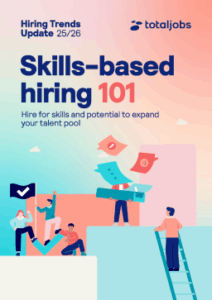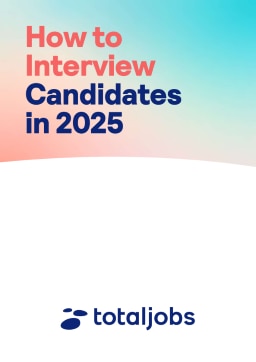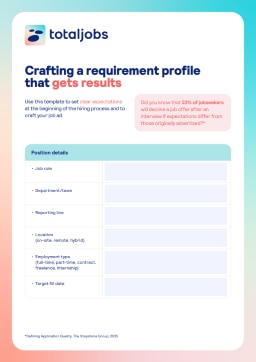
How to conduct competency-based interviews
Table of Contents
- Key takeaways
- What are competency-based interviews?
- Benefits of competency-based interviews
- Conducting competency-based interviews
- 10 competency-based questions
- Strategic talent acqusition
- FAQs

How to Interview Candidates

Skills Based Hiring Template
With finding candidates with the right skills a challenge for 70% of employers, competency-based interviews that assess a candidate’s specific abilities are an increasing vital recruitment technique.
In this article, we’ll explore what competency-based interviewing is and how you can implement it effectively.
Key takeaways
- Defining 4–6 core competencies and a structured scoring system before the interview is essential for success and alignment.
- The core of the competency interview process is gathering evidence of past behaviours, not relying on hypothetical claims.
- Ask every candidate the same core questions and evaluate them against the same criteria to ensure maximum fairness and objectivity.
- The structured nature of the competency-based interviews directly reduces subjective bias and ensures hiring decisions are data-led.
What are competency-based interviews?
Competency-based interviews are a structured methodology designed to accurately predict future job performance. These interviews move beyond hypothetical scenarios to gauge a candidate’s essential skills and operational behaviours, or competencies, required for success in a specific role.
To achieve this high predictive validity, competency-based interviews utilise a behavioural framework, most commonly the STAR method (Situation, Task, Action, Result). Interviewers ask candidates to recount specific, past work situations where they clearly demonstrated the targeted ability.
This approach provides employers with objective, evidence-based data on a candidate’s actual capabilities, which is crucial for making informed hiring decisions.
The benefits of competency-based interviews
With 43% of businesses prioritising skills-based hiring, adopting competency-based interviews is no longer just a best practice, it is a strategic necessity. Let’s take a look at some of the specific benefits
1. Ensure objectivity and mitigate bias
Traditional, unstructured interviews often leave significant room for personal bias, where decisions can be unduly influenced by subjective factors like:
- Shared experience
- Personal rapport
- Likability
Competency-based interviews provide a structured evaluation framework, ensuring every candidate is assessed against the exact same, predetermined criteria and performance indicators. By concentrating on objective behavioural evidence rather than personal characteristics, this standardisation is highly effective in mitigating unconscious bias, resulting in fairer comparisons and fostering a more inclusive recruitment process.
2. Expand access to diverse talent pools
By concentrating on demonstrable competencies rather than passive criteria (such as specific years of experience or conventional qualifications), this approach makes it easier to identify high-potential candidates who might otherwise be overlooked in a conventional hiring process.
This focus is particularly valuable when recruiting for positions where transferable skills (e.g., leadership, adaptability, critical thinking) are more important than industry-specific experience. By prioritising proven, applied abilities, employers can attract and validate candidates from highly diverse backgrounds whose career paths may not have followed a traditional route.
3. Lower financial risk and costly hire
A poor hiring decision is a significant drain on resources, measured:
- High financial costs
- Lost productivity
- Potential team disruption
Candidates selected based on superficial alignment (like personality fit or academic prestige) rather than verified competencies are far more likely to fail to meet job expectations.
Competency-based interviews significantly reduce this risk by ensuring that candidates provide clear evidence of successful application of skills in real-world scenarios. This ensures that new hires possess the operational capabilities needed to excel, decreasing the likelihood of costly turnover and subsequent repeated recruitment efforts.
4. Drive long-term employee retention
Employees who are genuinely well-suited to the core demands of their roles are positioned for success and are significantly more likely to remain with the organisation for the long term.
When hiring decisions are grounded in the accurate assessment of actual competencies, it leads to:
- Increased job satisfaction (due to genuine fit)
- Enhanced performance and productivity
Reduced employee turnover and lower recruitment frequency
5. Strengthen employer brand and candidate experience
A fair, structured, and transparent interview process leaves a powerful and lasting positive impression on all applicants, regardless of the outcome.
When candidates feel they have been given a clear, equitable opportunity to showcase their skills, they are more likely to view an organisation favourably. This intentional transparency helps to strengthen employer brand, assisting in attracting top talent and cultivating a reputation as an organisation that prioritises merit, professionalism and fairness
How to conduct a competency-based interview
Successfully implementing competency-based interviews requires careful planning to ensure they effectively assess candidates’ required skills and behaviours.
Here are some of the key steps you can implement to get started.
1. Identify key competencies and criteria
Before crafting questions, you need to define the essential competencies for the role. These should encompass both technical abilities and the core behavioural attributes critical for success within your organisation.
To establish a solid framework:
- Review the job description: Note key responsibilities, required knowledge, and essential skills.
- Consult stakeholders: Speak with current employees and hiring managers to identify the competencies that truly drive success in the role.
- Create a shortlist: Finalise the skills, behaviours, and knowledge areas that matter most for objective assessment.
Example: Content and Communications Executive Competencies
| Competency | Definition |
| Organisation | Managing multiple projects and deadlines effectively. |
| Copywriting | Crafting engaging, high-quality content tailored to different audiences. |
| Creativity | Generating innovative ideas and presenting them persuasively. |
| Collaboration | Working effectively with colleagues and stakeholders towards shared goals. |
2. Establish a robust scoring system
A structured scoring system is vital for ensuring fairness and consistency when evaluating candidates. This allows for objective comparison and evidence-based decision-making.
Consider using:
- A numerical scale (e.g., 1–5) to rate responses based on the depth and quality of the demonstrated behaviour.
- A checklist of key criteria that candidates must meet for each essential competency.
3. Developed targeted questions
With your competency list and scoring system in place, develop specific questions designed to prompt candidates to provide real-world examples of their skills in action.
Examples questions (based on STAR method)
| Competency | Example question |
| Organisation | “Tell us about a time when you had to manage multiple deadlines. How did you ensure everything was completed on time?” |
| Copywriting | “Describe an experience where you had to tailor content for different audiences or platforms. How did you approach that task?” |
| Creativity | “Can you share an example of a new idea you introduced at work? How did you gain support for it?” |
| Collaboration | “Give an example of a time when you worked as part of a team to achieve a goal. What was your contribution, and what was the outcome?” |
4. Guide the candidate experience
Interviews can be nerve-wracking, and a stressed candidate may not perform at their best. Giving candidates advance notice that the interview will follow a competency-based format allows them to prepare relevant examples.
You may also wish to provide an overview of the interview structure, such as:
“We’ll begin by discussing your CV and experience, followed by competency-based questions related to the role. At the end, we’ll give you the opportunity to ask any questions you may have.”

Tip: Encourage candidates to draw on examples from volunteer work, education, or other relevant experiences, not just previous jobs, so they can present the strongest possible evidence of their abilities.
5. Maintain interview consistency
A structured scoring system ensures fairness and consistency when assessing candidates. Consider using:
- A numerical scale (e.g., 1-5) to rate responses based on relevance and quality.
- A checklist of key criteria to see if candidates meet essential competencies.
By standardising your assessment, you can compare candidates objectively and make evidence-based hiring decisions.
6. Take detailed notes
Recording candidates’ responses during the interview is essential for an objective evaluation and crucial for providing constructive feedback, regardless of the ultimate outcome.
A best practice is to have a two-person panel: one interviewer should lead the conversation and engage with the candidate, while the second focuses entirely on taking accurate, detailed notes of the behavioural evidence provided. This ensures the candidate receives full attention while the responses are captured accurately for later review and scoring.
10 core competency-based interview questions
| Competency | Example question | What is assess |
| Time management and organisation | “Tell me about a time when you had to meet a tight deadline. How did you ensure timely completion of the task?” | Assesses the candidate’s ability to work under pressure, prioritise tasks, and maintain productivity through effective planning and organisational skills. |
| Teamwork and collaboration | “Describe a situation where you had to work as part of a team to achieve a goal. What was your role, and what was the outcome?” | Identifies the candidate’s ability to contribute to a group effort, handle interpersonal dynamics, and demonstrate strong communication and conflict-resolution skills. |
| Problem-solving initiative | “Explain a time when you identified a problem and took steps to resolve it. What was the issue, and what action did you take?” | Evaluates the candidate’s analytical thinking, initiative, and approach to diagnosing issues, developing solutions, and implementing them successfully. |
| Leadership and resilience | “Tell me about a decision you made that was not popular and how you handled it.” | Assesses the candidate’s ability to stand by their decisions, communicate tough calls effectively, and manage any resulting conflicts or resistance. |
| Adaptability and flexibility | “Describe a time when you had to adapt to a significant change at work. How did you handle it?” | Reveals the candidate’s capacity to manage change, maintain productivity, and demonstrate a positive attitude in the face of new challenges or environments. |
| Drive for results and goal setting | “Give an example of a goal you set and how you achieved it.” | Helps understand their drive, ambition, and the strategies they use to plan, execute, and take an active role in their own professional development. |
| Continuous learning and feedback | “Describe a time when you received constructive feedback. How did you respond, and what did you do as a result?” | Evaluates their receptiveness to feedback, self-awareness, humility, and commitment to personal and professional improvement. |
| Attention to detail and quality focus | “Can you describe a situation where a minor oversight could have caused a significant problem? What steps did you take to ensure accuracy?” | Assesses their vigilance, precision, and the systematic processes they use to minimise errors and ensure high-quality output. |
| Conflict resolution and negotiation | “Tell me about a time you had to mediate a disagreement between two colleagues or stakeholders. What was your approach and the final resolution?” | Evaluates their ability to remain impartial, negotiate outcomes, and diplomatically resolve tension to maintain a functional working environment. |
| Customer focus and service orientation | “Give an example of when you went above and beyond to satisfy a demanding customer or client. What was the challenge, and what was their reaction?” | Highlights their dedication to service, communication skills under pressure, and their ability to prioritise client needs for positive outcomes. |
Strategic talent acquisition
Implementing competency-based interviews is one of the most powerful steps an organisation can take toward strategic talent acquisition. By shifting the focus from biographical background to proven operational capabilities, these interviews deliver a robust framework for objective, evidence-based hiring.
This rigorous process not only reduces the financial and productivity risks associated with bad hires but also provides access to diverse talent pools while strengthening employer branding. Ultimately, adopting this structured approach ensures you select candidates who are genuinely equipped to excel and thrive in their new roles, driving long-term success for your team.
Frequently asked questions (FAQs)
What is the main difference between a traditional and a competency-based interview?
Traditional interviews are often unstructured and rely on hypothetical questions or general discussion. Competency-based interviews use structured, behavioural questions to elicit specific, verifiable examples of a candidate’s past performance and actions.
Should I ask every candidate the exact same core questions?
Yes, this is mandatory. Asking all candidates the same core questions is essential to maintain consistency, objectivity, and fairness, ensuring all applicants can be compared equally against the established criteria.
How do competency-based interviews actively reduce bias?
They reduce bias by requiring interviewers to rate candidates solely against objective, job-related criteria and evidence provided, rather than subjective factors such as personal rapport, shared background, or ‘gut feeling’.
How many competencies should I focus on for a single role?
It is generally recommended to focus on 4 to 6 core competencies. Assessing too many can lead to an overly long interview and dilute the depth of your evaluation.
Receive the latest recruitment resources and
advice to boost your hiring
By providing us with your details you agree to our privacy policy and for us to keep you updated with the latest news, events,
and special offers from Totaljobs.










